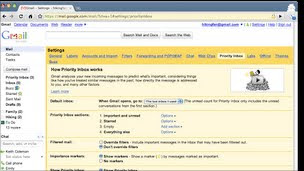Google has updated Gmail with a feature that aims to reduce information overload in e-mail inboxes.
Called priority inbox it automatically grades e-mail into four categories: important, important and unread, starred items and everything else.
(Priority Inbox will roll out to Gmail users in September)
Experts believe less time sifting through e-mail will make people more productive.
Google said the product acts like your "personal assistant helping you focus on the messages that matter".
"There are a lot of signals in any message that indicate importance," Keith Coleman, Gmail director told BBC News.
"Basic indicators include if this message is from someone you write to a lot or reply to a lot. Another category is terms - if the word Viagra is in the message, it is indicative of junk mail. And a third factor is something known as static features. That is if the message has been sent to you directly or to you and other people or a list of people."
Google said the feature "gets smarter" the more a user uses it as it learns what is important to an individual. There is a plus or minus tool within the feature to boost or reduce the priority status of a message. This allows the product to learn which electronic communications matter more than others.
"Our hope is that people can regain time and attention and not feel the need to constantly check e-mail in the middle of meetings," said Mr Coleman.
"We want people to walk away from e-mail and focus on what they are doing at that moment like thinking or reading, spending time with the family or taking part in a meeting. We hope this gives people a little more sanity and physical time in their day."
Information overload
Various studies have shown that people are being weighed down by the number of e-mails flowing into their inboxes.
(The new priority inbox is optional )
The Radicati Group has said that in 2010, 294 billion e-mails are sent each day with the typical corporate user sending and receiving about 110 messages a day.
The new priority inbox is optional Hi-tech giant Intel estimated back in 2007 that the impact of information overload at up to eight hours a week.
Douglas Merrill understands the problem all too well.
The former chief information officer at Google is the author of "Getting organised in the Google Era" and lectures on the topics of organisation, innovation and information technology.
"E-mail is a great tool, but also a key contributor to overload. There are about 1.5 billion mail users worldwide, and almost 1 million (non-spam) e-mails sent each second. That works out at roughly 250Gb of mail per second, which is the equivalent of 2,000 hardcover books.
"That's a lot of mail. You can't possibly read or process it all. You will stress your brain beyond capacity," Mr Merrill told the BBC.
Google worked onthe product internally for about 18 months and tested it on its own employees in a process known as "dog fooding". Early results were encouraging said Google's Mr Coleman.
"We have seen people who use priority inbox spend 13% less time reading unimportant e-mail. That adds up to a week a year. Even with that rough measurement people are gaining back a significant amount of time in the day which was being lost trawling through e-mail.
"One of the biggest changes we have seen is people walking away and leaving their inbox and just not worrying about it as much because everything is marked and it's easy to see the important stuff," said Mr Coleman.
Google is not alone in trying to solve this problem. Microsoft has updated its Hotmail e-mail system to help people organise messages better. Also stand-alone products such as Xobni and Liaise take a similar approach to that adopted by Google.
Tuesday, August 31, 2010
Subscribe to:
Post Comments (Atom)











0 comments:
Post a Comment